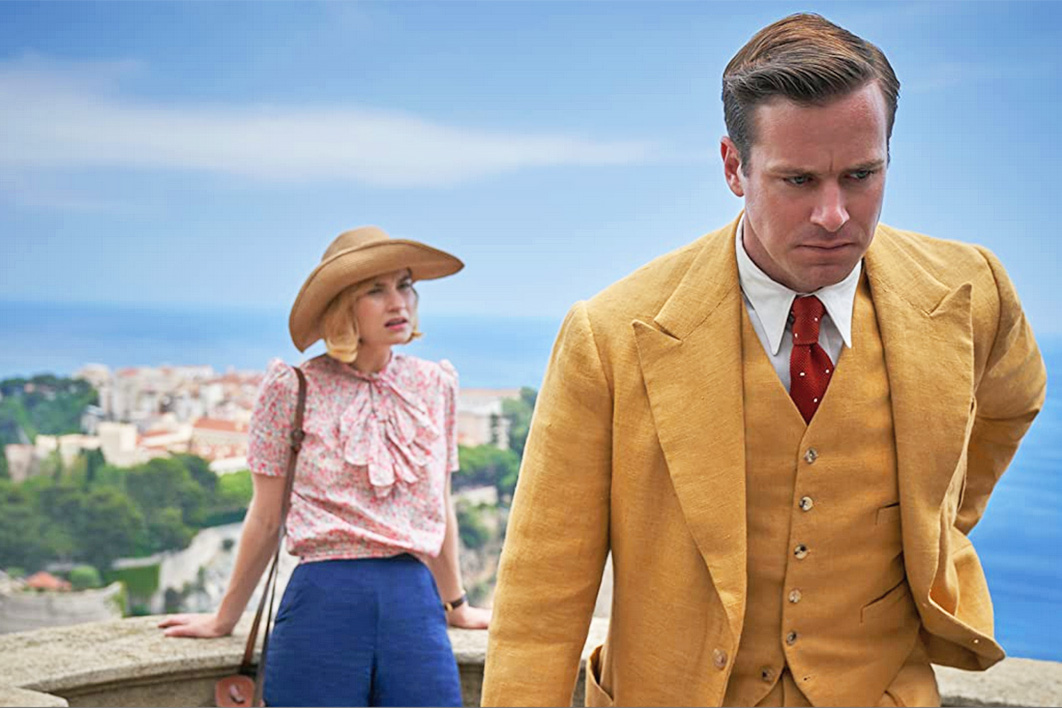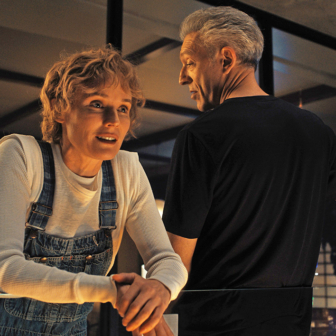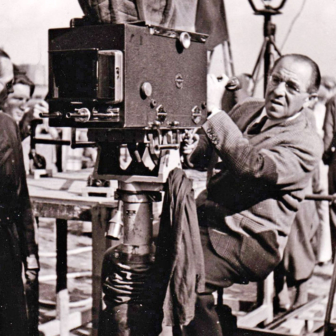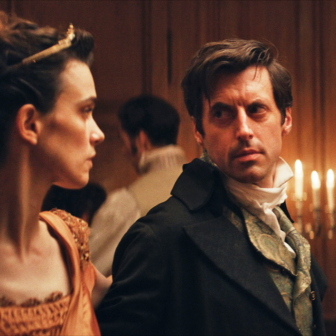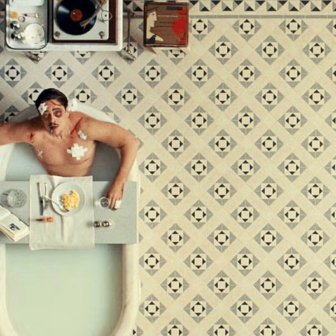If Ben Wheatley’s remake of Rebecca has shown us one thing it is that (almost) everyone loves Hitchcock’s version and Judith Anderson’s Mrs Danvers. Part of social media this week has been a lovefest for the original Rebecca and its creepy housekeeper. “There is only one Mrs Danvers: Judith Anderson,” sums up the consensus among these commentators. And reviewers in everything from the New Yorker to Vulture (the go-to entertainment news site for the culturally obsessed) have asked plaintively, “Why go back again?”
Variety, reviewing the original Rebecca in March 1940, had been doubtful of its appeal to the public. It was an artistic success, they conceded, but its “b.o. [box office] lure” would be limited. They were wrong: Rebecca became one of the great box office successes of all time; and Judith Anderson’s Mrs Danvers became an iconic figure, the subject of numerous scholarly analyses and a popular culture heroine.
The 1940 Rebecca had everything going for it. Du Maurier’s novel, published in 1938, was a runaway bestseller. Producer David O. Selznick, fresh from the spectacular success of Gone with the Wind, winner of ten Academy Awards and still the highest-grossing film in history, snapped up Rebecca soon after publication on the recommendation of his New York agent, Kay Brown. He and Brown had been courting British director Alfred Hitchcock for some time. Selznick quickly signed him up and they began the long process of casting the movie.
As with Gone with the Wind, the search for the perfect lead actress was played out in public. Selznick originally wanted Carole Lombard to play the shy young Mrs de Winter, and later considered Olivia de Havilland, Margaret Sullavan, Loretta Young, Vivien Leigh, Anita Louise, Jean Muir and Anne Baxter. He finally took a gamble on the untried Joan Fontaine, who proved to be ideal in the role. As one critic put it, she did “mousy” very well.
The search for the actor to play Maxim de Winter was no less arduous. Selznick’s original choice had been the heart-throb Ronald Colman, but Colman didn’t want to play in what he considered a woman’s starring vehicle. His second choice was William Powell; but Laurence Olivier, who was playing Heathcliff in Wuthering Heights, was cheaper and, in late June 1939, was finally given the part.
Selznick and Hitchcock recognised the importance of the role of Mrs Danvers, the housekeeper whose loyalty and devotion to the first Mrs de Winter creates much of the mood of the story. They immediately agreed to try to get the British actress Flora Robson, who was about to play the housekeeper in Wuthering Heights, for the part; but she had other commitments and her availability was uncertain.
This was when Kay Brown raised the possibility of Judith Anderson as Mrs Danvers. Anderson wrote in her memoirs, “I made the screen test. I got the job.” But it was more complicated than that. There were other major contenders — including Nazimova, the eminent Russian-born actress, who was “crazy to play Mrs Danvers,” and Eily Malyon, a well-established character actress in Hollywood who had spent her early career in Australia — and Selznick and Hitchcock still preferred Robson. But when Robson decided she was not available, Kay Brown urged them to move quickly to secure Anderson.
Anderson arrived in Hollywood at the end of June 1939 to take a screen test for Rebecca. On 18 July she was told that she had the role. As the press release from Selznick International Pictures emphasised, she was one of the leading actresses on the American stage and had recently been selected as the best actress of the year by the New York Drama Critics. She had only appeared on film twice before: once, in 1929, in a short called Madam of the Jury, and more substantially in Blood Money, filmed in 1933, which was mostly disregarded at the time but is now considered a classic of the period.
As soon as Anderson’s casting as Mrs Danvers was decided, David Selznick peppered his staff with instructions about makeup, hairdo and costumes. “Get hold of Anderson immediately about letting her eyebrows grow,” he ordered his makeup chief. When it was finally announced, in early September, that Joan Fontaine would have the coveted role of the second Mrs de Winter, shooting started.
The story of Rebecca is well known. The young insecure second wife, who is never named, is subtly terrorised by the housekeeper, Mrs Danvers, who is obsessed with the memory of her former mistress, Rebecca. There are strong sexual overtones to this obsession (the caressing of Rebecca’s fur, the stroking of her undergarments kept lovingly in their original drawers), which Anderson manages to convey convincingly despite the censor’s admonition to Selznick that there must be no suggestion that the first Mrs de Winter was “a sex pervert.”
Rebecca has become one of the favourite movies of all time, with Anderson’s performance as the chilly Mrs Danvers considered as one of the most memorable. “I felt secure in that character,” she told reporters. “Sometimes there are little hurdles in character… and you have to get over those lines as best you can. But Danvers never deviated — just one clear drive from the beginning.” Hitchcock, she went on, “is a very tolerant director and a very kindly man. In the scene where Danvers suggests the girl jump out the window, he said to me, ‘Go to the window, open it, look at her, look away and say, quite matter-of-factly, “You need a little air, madam.”’ Very quiet, very gentle, very terrifying.”
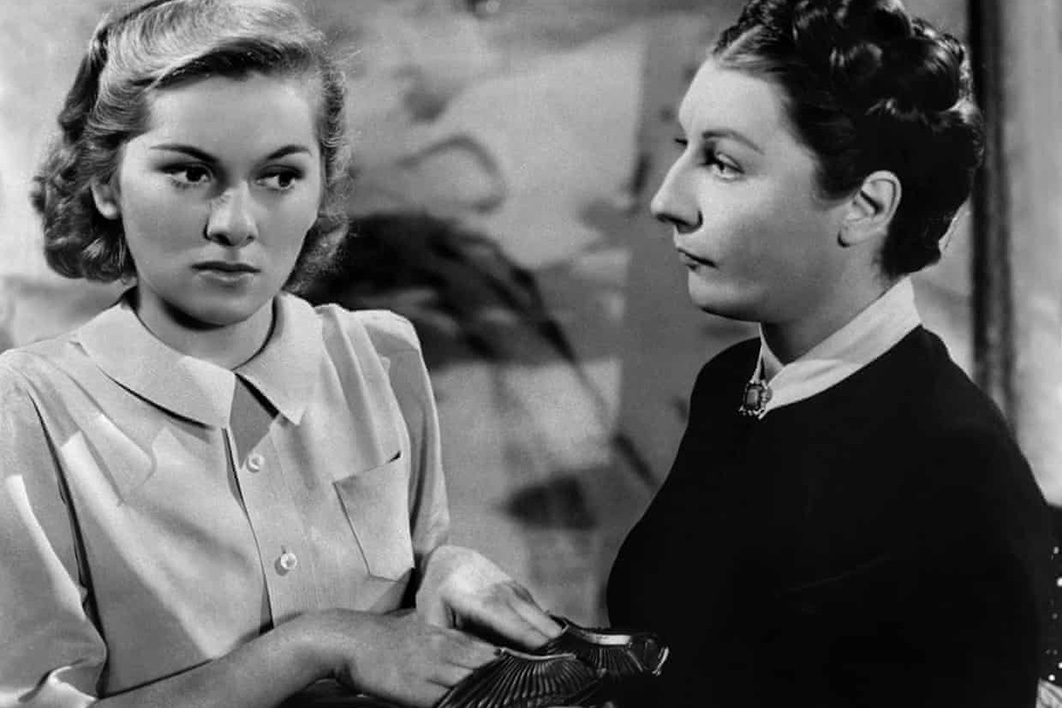
“Ominous and ever present”: Judith Anderson (right) as Mrs Danvers, with Joan Fontaine as Mrs de Winter, in Alfred Hitchcock’s Rebecca.
Hollywood Magazine noted how Anderson’s principal gifts as a stage actress — her “smooth voice and fluid body” — “give the part of Danny [Mrs Danvers] the quality of living danger and waiting disaster so essential if the story is to be believed at all.” As Ed Sullivan put it, “It was the first time a performer has achieved a quality of menace by simply folding her hands. That’s what Miss Anderson accomplished, but if those folded hands had concealed a hooded cobra the alarm could not have been more intense or the fear more emphatic.”
Variety devoted a two-page spread to the New York opening at Radio City Music Hall in March 1940, showing the street jammed with people hoping to get tickets. “In the first five days,” its headline noted, “Radio City Music Hall played to more than 150,000 admissions and turned away close to 75,000 additional ticket-buyers.” By the time it finished its six-week run at the “Showplace of the Nation,” it had been seen by an estimated 900,000 people. Named on the Film Daily and National Board of Review of Motion Pictures “ten best list” for 1940, along with The Grapes of Wrath (first), The Great Dictator, Our Town, Fantasia, The Long Voyage Home, Foreign Correspondent, The Biscuit Eater and Gone with the Wind, it grossed US$6 million that year, ranking fourth behind the Disney animations and MGM’s Boom Town.
In February 1941 Rebecca was nominated for eleven Academy Awards: best picture, best actor, best actress, best supporting actress, best director, best cinematography, best screenplay, best black-and-white art direction, best film editing, best musical score and best special effects. Edward Schallert, in the Los Angeles Times, predicted a “hot” race for best supporting actress among Judith Anderson in Rebecca, Jane Darwell in The Grapes of Wrath and Ida Lupino in They Drive by Night. On the awards night, 27 February, at the Biltmore Bowl, Rebecca was voted the best picture of the year — a triumph for Selznick — and George Barnes won for best cinematography; but Hitchcock, Fontaine, Olivier and Anderson were disappointed when John Ford was named best director for The Grapes of Wrath, Ginger Rogers best actress for Kitty Foyle, James Stewart best actor for Philadelphia Story and Jane Darwell best supporting actress for The Grapes of Wrath.
Henry Fonda as Tom Joad in The Grapes of Wrath and Judith Anderson as Mrs Danvers have remained among the greatest heroes and villains respectively in movie history. Although initial publicity for Rebecca featured the romantic couple, Laurence Olivier and Joan Fontaine, gradually scenes of Judith Anderson menacing the timorous young Fontaine took their place.
The Chicago Sunday Tribune, always a fan of Anderson, featured on the front of their movie section what has become a classic image of Anderson standing behind Fontaine urging her to “Jump, jump.” “Ominous and ever present stands the still, bitter housekeeper Mrs Danvers, at the elbow of the gentle, timorous second Mrs de Winter,” the caption read. “Joan Fontaine and Judith Anderson portray the role of wife and housekeeper in the screen version of Daphne du Maurier’s novel.” This image has gradually overtaken the romantic one, and invariably accompanies discussion of the movie in recent years.
In the face of all this, how brave is Ben Wheatley to pit himself against Alfred Hitchcock — and Kristin Scott Thomas against Judith Anderson? Let alone Armie Hammer against Laurence Olivier and Lily James against Joan Fontaine?
To give him his due, Wheatley has not tried to follow Hitchcock. In the original Rebecca the love story is between Mrs Danvers and Rebecca — a love affair conveyed by waves, shadows, gestures and glances. In the remake, Wheatley focuses on the love affair between Maxim de Winter and his new wife, an affair that is tepid at best and ultimately chilling, although it proceeds in rom-com fashion and ignores the fact that Maxim has murdered his first wife. Even Laurence Olivier’s greatest admirers must admit that he is boring as Maxim, not because he is lacking as an actor, but because Maxim is uninteresting. The only reason we continue to watch the movie is the interaction between the fragile new wife, Mrs Danvers and the dead Rebecca. Once they disappear in the second half of the movie, it loses its interest.
Wheatley’s focus on this uninteresting love affair gives the kiss of death, in my opinion, to the remake. Young viewers apparently admire the tall, muscular, conventionally handsome Armie Hammer, but he seems to me totally miscast as the grieving widower and controlling new husband. Whereas Olivier managed to enliven Maxim with a few black looks and outbreaks of temper, Hammer seems incapable of expressing emotion.
Lily James (who played one of those annoying young women who came into Downton Abbey towards its end) is far too attractive and well dressed to play the dowdy mouse who captivates the lonely Maxim, and Wheatley (or the scriptwriters) turn her into a spirited feminist heroine far too quickly — a feminist, I must add, who is quite happy to go off with her murderer husband at the end of the movie. (I am actually grateful that Hollywood’s notorious censorship code saved us from that ending in the original.)
Kristin Scott Thomas is the only one who wins in this new Rebecca. Hers is not a win against the great Judith Anderson, but a personal win, with a new interpretation of the redoubtable Mrs Danvers that doesn’t attempt to replicate Anderson’s subtle eroticism. Her Mrs Danvers is a possessive mother who has lost her darling Rebecca. Her vindictiveness is aimed at humiliating this cuckoo in the nest, not killing her. In the end she is sad, not mad, her jump to her death registering nothing of the horror of Anderson’s death in the fire that destroys Manderley.
Let’s face it, the new Rebecca is a mess. A brave mess perhaps, but a mess. It is, as Rachel Syme points out in her New Yorker review, a typical Netflix paint-by-numbers movie:
Streaming executives, who have admitted that they use data to calibrate the films and shows they produce, seem to believe that films like the Rebecca remake give viewers exactly what they want. “Here,” they seem to say. “Here is some maximalist fare with actors you have heard of — press Play for serotonin”… They really do think we’ll watch anything. And perhaps, in the end, they are right. We are stuck at home; it is spooky season. But du Maurier’s story deserves better… The new Rebecca offers up gif-ready fantasy on a platter, but it never gives us a chance to dream of Manderley again.
But those streaming executives know what they are doing. Members of a younger generation who have never seen the original, and probably haven’t heard of Judith Anderson, Laurence Olivier or Joan Fontaine, let alone Alfred Hitchcock and David O. Selznick, are enjoying this current version. “netflix did a film adaptation of my favorite book, rebecca by daphne du maurier, and im crying so hard because it’s so perfect,” one tweeter wrote. “Fab cast! Yay!” wrote another. A third was clear-eyed and accepted its “gif-ready” quality: “Now I get why critics r so angry with Rebecca. They see Lily, Armie, KST, Wheatley & they thought oof they must be vying for awards. By any stretch of the imagination, it’s not competing for any awards. It’s a 2 hr trashy Netflix fun to enjoy in ur free time.”
We can be sure that this version of Rebecca will not be remembered in eighty years’ time. But for the moment it is trending #1 on Netflix in many countries. We can only hope that some of these viewers will be motivated to go back to the original, even if it is in black and white, the clothes are not so flashy and, as one tweeter put it, it’s not so “kissy, kissy.” •
